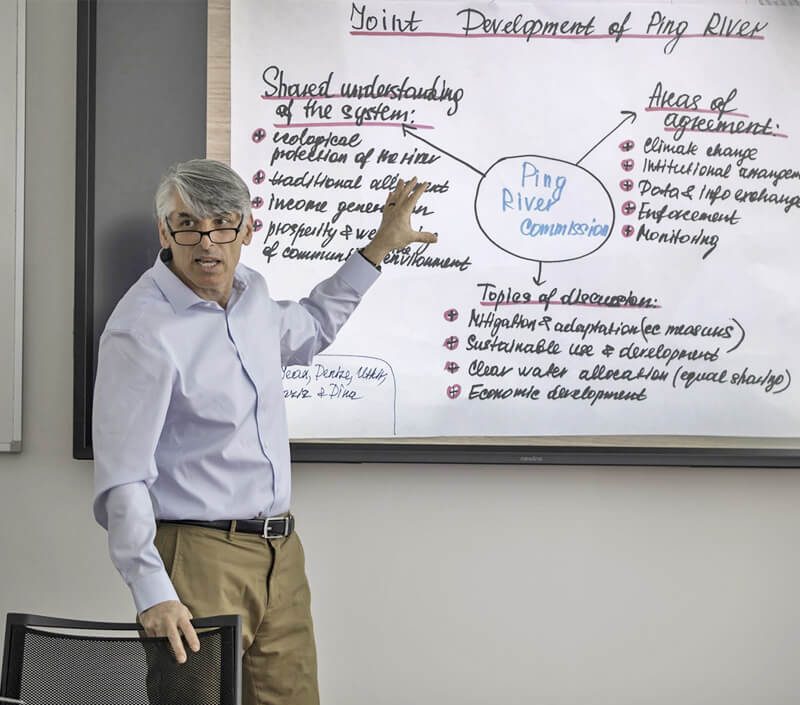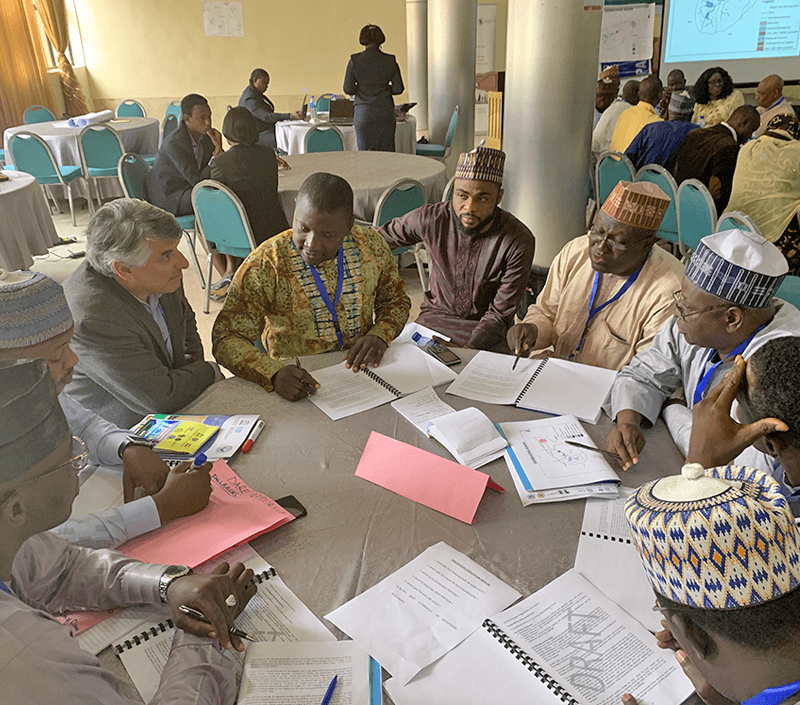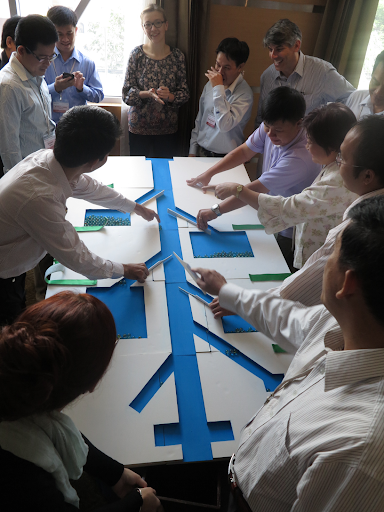


Aaron T. Wolf is a water resources geographer at Oregon State University and a trained mediator/facilitator. He directs the Program in Water Conflict Management and Transformation, through which he has offered workshops, facilitations, and mediations around the world. He is the author of The Spirit of Dialogue: Lessons from Faith Traditions in Transforming Conflict (Island Press, 2017), that he uses to bring facilitation and capacity-building to a variety of conflict settings, notably between entities who share water resources, and also in faith and interfaith communities, and within and between government agencies.
Wolf was awarded the 2016 American Association of Geographers Gilbert R. White Distinguished Public Service Honor “in recognition of his work on seeking peaceful approaches to international competition over water resources,” and the 2015 Heinz Award for Public Policy for “applying 21st century insights and ingenuity, as well as ancient wisdoms, to complex problems for the security of the planet.”
Shared Waters Conflict Prevention, Management, and Transformation
Water Resources and Environmental Institutional Development and Policy Analysis
Intra- and interfaith disputes
Ph.D. Emphasis: Environmental Policy Analysis
University of Wisconsin, Madison, WI
Land Resources Program, 1990-92
M.S. Emphasis: Hydrogeology
University of Wisconsin, Madison, WI
Water Resources Management Program, 1988-90
B.A., Magna Cum Laude, Phi Beta Kappa
San Francisco State University, San Francisco, CA
Major: Physical Geography/Resource Management, 1982-85
Oregon Academy of Sciences
Association of Pacific Coast Geographers
Association of American Geographers
American Water Resources Association
International Water Resources Association
International Association for Water Law (Associate Member)
The Association for Contemplative Mind in Higher Education
Nominated OSU Honors College Outstanding Professor of the Year Award, Spring 2016.
Awarded by the American Association of Geographers, the Gilbert F. White Distinguished Public Service Honors. AAG Honors are the highest awards offered by the Association, offered annually in six categories “to recognize outstanding accomplishments by members.”
Awarded “in recognition of his work on seeking peaceful approaches to international competition over water resources.”
Awarded, by OnPoint Corporation, “Faculty of the Game,” awarded each home football game to an OSU faculty member of merit, 4 September 2015.
Awarded, by the Heinz Family Foundation, the 2015 Heinz Award for Public Policy. Cited for “applying 21st- century insights and ingenuity, as well as ancient wisdoms, to complex problems for the security of the planet.”
Awarded, by OSU Outreach & Engagement Vice Provost Award for Excellence – Strategic Impact Award, for the Natural Resources Leadership Academy, 2014.
Awarded, by the Fondazione Parchi Monumentali Bardini Peyron, first place for the 2013 Il Monito del Giardino Environmental Award, Florence, Italy, 5 June 2013.
Awarded, by TWAS, The Academy of Sciences for the Developing World, Visiting Scientist Program award to collaborate with the International Water Management Institute in Vientiane, Laos, April-May 2013.
Awarded, by the Western Association of Summer Session Administrators, Best Credit Program and the Best Overall Program awards for the Natural Resources Leadership Academy, 2012.
Department awarded OSU Graduate School Family Friendly Faculty Award, Spring 2011. Named “Working Class Hero,” by Miller-McCune Magazine, January/February 2009.
Awarded the OSU Milton Harris Award in Basic Research, 2008.
Awarded a Center for the Humanities Fellowship for 2007-08.
Web Site Inducted to Thomas Scientific ISI Web of Knowledge, a linked database of, “high-quality, scholarly web sites.” December 2006.
Finalist, OSU Lloyd Carter Award for Outstanding and Inspirational Teaching at the Graduate Level. Sept. 2006. Inducted as Fellow, International Water Resources Association, which recognizes, “exceptional professional skills and service to society and to the mission of the IWRA.” April 2005.
Inducted as a Life Member, International Water Academy, Oslo, Norway, February 2003.
Next Generation of Water Leaders. Named one of 15 “leaders” by the Third World Centre for Water Management, the International Water Resources Association, and the Stockholm International Water Institute in 1999 for a three year project of apprenticeship and planning.
1997 Best Paper, Agricultural and Resource Economics Review, for A. Dinar and A. Wolf. “Economic and Political Considerations in Regional Cooperation Models.” Vol 26 #1, April 1997.
Outstanding Freshman Teacher Award, presented by ALPHA LAMBDA DELTA Honorary, Spring 1997. Inducted to PHI BETA DELTA, Honorary Society of International Scholars, March, 1995.
Inducted to PHI BETA KAPPA, Honor Society, December, 1985.
Aaron helped found the Universities Partnership for Water Cooperation and Diplomacy, a global consortium of academic expertise in fields related to water resources conflict prevention and resolution, including more than 20 research institutions on five continents, established at the World Economic Forum in Davos, Switzerland in February 2018.

Wolf, A. The Spirit of Dialogue: Lessons from Faith Communities in Transforming Conflict. Washington, DC: Island Press, 2017.
Subramanian, Ashok, Bridget Brown, and Aaron Wolf. Reaching Across the Waters: Facing the Risks of Cooperation in International Waters. Washington DC: The World Bank Press, 2012.
Delli Priscoli, Jerry and Aaron T. Wolf. Managing and Transforming Water Conflicts. Cambridge: Cambridge University Press, 2009.
Beach, L., J. Hamner, J. Hewitt, E. Kaufman, A. Kurki, J. Oppenheimer, and A. Wolf. Transboundary Freshwater Dispute Resolution: Theory, Practice and Annotated References. Tokyo and New York: United Nations University Press, 2000.
Biswas, A., J. Kolars, M. Murakami, J. Waterbury, and A. Wolf. Core and Periphery: A Comprehensive Approach to Middle Eastern Water. Oxford: Oxford University Press, 1997.
Wolf, A. Hydropolitics Along the Jordan River: The Impact of Scarce Water Resources on the Arab-Israeli Conflict. Tokyo and New York: United Nations University Press, 1995.
Wolf, A. A Purity of Arms. New York: Doubleday Books, 1989.
Books (edited/co-edited):
Wolf, A., ed. Hydropolitical Vulnerability and Resilience Along International Waters: Asia. Nairobi: UN Environment Programme, 2009.
Wolf, A., ed. Hydropolitical Vulnerability and Resilience Along International Waters: Europe. Nairobi: UN Environment Programme, 2009.
Wolf, A., ed. Hydropolitical Vulnerability and Resilience Along International Waters: North America. Nairobi: UN Environment Programme, 2009.
Wolf, A., ed. Hydropolitical Vulnerability and Resilience Along International Waters: Latin America and the Caribbean. Nairobi: UN Environment Programme, 2007.
Published in Spanish as, Vulnerabilidad y Resistencia Hidropolíticas en Aquas Internacionales: América Latina y el Caribe. Nairobi: UN Environment Programme, 2007.
Wolf, A., ed. Hydropolitical Vulnerability and Resilience Along International Waters: Africa. Nairobi: UN Environment Programme, 2006.
Jordan, J. and A. Wolf, eds. Interstate Water Allocation in Alabama, Florida, and Georgia. Gainesville: University Press of Florida, 2006.
UN Environment Programme and Oregon State University. Atlas of International Freshwater Agreements. Nairobi, Kenya: UNEP Press, 2002.
Wolf, A. ed. Conflict Prevention and Resolution in Water Systems. Cheltenham, UK: Elgar, 2002.
Amery, H. and A. Wolf, eds. Water in the Middle East: A Geography of Peace. Austin: University of Texas Press, 2000.
Wolf, A. The Spirit of Dialogue: Lessons from Faith Communities in Transforming Conflict. Washington, DC: Island Press, 2017.
Subramanian, Ashok, Bridget Brown, and Aaron Wolf. Reaching Across the Waters: Facing the Risks of Cooperation in International Waters. Washington DC: The World Bank Press, 2012.
Delli Priscoli, Jerry and Aaron T. Wolf. Managing and Transforming Water Conflicts. Cambridge: Cambridge University Press, 2009.
Beach, L., J. Hamner, J. Hewitt, E. Kaufman, A. Kurki, J. Oppenheimer, and A. Wolf. Transboundary Freshwater Dispute Resolution: Theory, Practice and Annotated References. Tokyo and New York: United Nations University Press, 2000.
Biswas, A., J. Kolars, M. Murakami, J. Waterbury, and A. Wolf. Core and Periphery: A Comprehensive Approach to Middle Eastern Water. Oxford: Oxford University Press, 1997.
Wolf, A. Hydropolitics Along the Jordan River: The Impact of Scarce Water Resources on the Arab-Israeli Conflict. Tokyo and New York: United Nations University Press, 1995.
Wolf, A. A Purity of Arms. New York: Doubleday Books, 1989.
McCracken, Melissa, Laura E. R. Peters and Aaron T. Wolf. “Megatrends in Shared Waters in 2030 and Beyond.” In Asit K. Biswas, Cecilia Tortajada, and Philippe Rohner, eds. Assessing Global Water Megatrends. New York: Springer, 2018
Wolf A.T. “International Waters: Conflict, Cooperation, and Transformation.” 2018. In: Dominick A. DellaSala, and Michael I. Goldstein (eds.) The Encyclopedia of the Anthropocene, vol.[4], pp. 291-299. Oxford: Elsevier.
Marshall, Dena, Léna Salamé, and Aaron T. Wolf. “A Call for Capacity Development for Improved Water Diplomacy.” In: Shafiqul Islam and Kaveh Madani, eds. Water Diplomacy in Action: Contingent Approaches to Managing Complex Water Problems. London & NY: Anthem, 2017. pp. 141-154.
Rai, Subash Prasad, Aaron T. Wolf, Nayan Sharma, and Harinarayan Tiwari. “Hydropolitics in Transboundary Water Conflict and Cooperation.” In: N. Sharma (ed.), River System Analysis and Management. Singapore: Springer, 2017.
Petersen-Perlman, J., J. Veilleux, and A. Wolf. “Transboundary Water Management.” In: Singh, Vijay P., ed. Handbook of Applied Hydrology. New York: McGraw Hill, 2016.
Veilleux, Jennifer, Matthew Zentner, and Aaron T. Wolf. “Relationship Between Freshwater Resources, Socio- Cultural Dynamics, and Geopolitical Stability.” In: Murdock, Darryl G., Robert R. Tomes, and Christopher K. Tucker, eds. Human Geography: Socio-Cultural Dynamics and Challenges to Global Security. USGIF Monograph Series Vol. 1, 2014, pp. 81-88.
MacQuarrie, Patrick and Aaron T. Wolf. “Understanding Water Security.” In: Floyd, Rita and Richard Matthew eds. Environmental Security: Approaches and Issues. London: Routledge, 2013. pp. 169-186.
Wolf, A. “Monitoring for Water Resources Conflicts: Change, Capacity, and Scale.” In Schneckener, U., A. von Scheliha, A. Lienkamp, B. Klage (eds.) Wettstreit um Ressourcen: Konflikte um Klima, Wasser und Boden. Munich: ClimatePartner, 2013. pp. 167-180.
Wolf, A. “International Waters: Conflict, Cooperation, and Transformation.” In Strong, B., L. Babin, M. Zbylut, and L. Roan (eds.) Sociocultural Systems: The Next Step in Army Cultural Capability. US Army Research Institute for the Behavioral and Social Sciences Research Product 2013-02, September 2013.
Fischhendler, I., A. Wolf, and G. Eckstein. “The Role of Creative Language in Addressing Political Realities: Middle-Eastern Water Agreements.” In: Megdal, S.B., Varady R.G. & Eden S. (eds.) Shared Borders, Shared Waters. Leiden, CRC Press/Balkema Taylor & Francis Group in cooperation with UNESCO-IHE, Delft. 2013. pp. 53-74.
McCaffrey, Stephen, Richard Paisley, Lynette de Silva, and Aaron T. Wolf. “The Columbia River Treaty in 2014 and Beyond: International Experiences and Lessons Learned.” in Cosens, Barbara (ed.). The Columbia River Treaty Revisited: Transboundary River Governance in the Face of Uncertainty. Corvallis: Oregon State University Press, 2012. pp. 365-382.
Wolf, A. “The Enlightenment Rift and Peacebuilding: Rationality, Spirituality, and Shared Waters.” In, Our Shared Future: Environmental Pathways to Peace – Revitalizing Community Within and Across Boundaries. Washington, DC: Woodrow Wilson Center, 2011.
Jarvis, T. and A. Wolf. “Managing Water Negotiations and Conflicts in Concept and in Practice.” in Anton Earle, Anders Jägerskog and Joakim Öjendal, eds. Transboundary Water Management: Principles and Practice. London and Washington DC: Earthscan, 2010.
Wolf, A. “A Long-Term View of Water and Security: International Waters, National Issues, and Regional Tensions.” in C. Lipchin, D. Sandler, and E. Cushman, eds. The Jordan River and Dead Sea Basin: Cooperation Amid Conflict. Dordrecht, Netherlands: Springer, 2009.
Giordano, M., A. Wolf, and M. Giordano. “Institutions for Transboundary Basins.” in C. Sadoff, T. Greiber, M. Smith, and G. Bergkamp, eds.. Share – Managing Water Across Boundaries. Gland, Switzerland: IUCN Publications, 2008.
Wolf, A. “International Water Agreements and Implications for the ACF/ACT.” in J. Jordan and A. Wolf, eds. Water Allocations in the Southeast: New Issues, New Methods, New Models. Gainesville: Universities of Florida Press, 2006.
Medzini, A. and A. Wolf. “The Euphrates River Watershed: Integration, Coordination, or Separation?” in M. Finger, L. Tamiotti, and Jeremy Allouche, eds. The Multi-Governance of Water: Four Case-Studies. Albany, NY: SUNY Press, 2006. pp. 103-146.
Puri, S., L. Gaines, A. Wolf, and T. Jarvis. “Lessons from Intensively Used Transboundary River Basin Agreements for Transboundary Aquifers.” in A. Sahuquillo, J. Capilla, L. Martínez-Cortina, and X. Sánchez-Vila eds. Groundwater Intensive Use. Leiden: A. A. Balkema, 2005. pp. 137-146.
Wolf, A. “Transboundary Water Conflicts and Cooperation.” Chap. 5 in D. Kenney, ed. In Search of Sustainable Water Management. Northampton, Mass: Edward Elgar Publishing, 2005, pp. 131-154.
Wolf, A. T., Annika Kramer, Alexander Carius, and Geoffrey D. Dabelko. “Managing Water Conflict and Cooperation.” Chapter 5 in Worldwatch Institute. State of the World 2005: Redefining Global Security. Washington DC: Worldwatch Institute, 2005.
Wolf, A. “’Water Wars’ and Other Tales of Hydromythology.” in B. McDonald and D. Jehl. Whose Water is It? The Unquenchable Thirst of a Water-Hungry World. Washington DC: National Geographic, 2003. pp. 109-124.
Translated into Spanish as, “Las ‘guerras’ y otros cuentos hidromitológicos.” Vanguardia Dossier. #21 October/December 2006. pp. 43-47.
Wolf, A. “The Present and Future of Transboundary Water Management.” in Figuères, C., C. Tortajada, and J. Rockström, eds. Rethinking Water Management. London: Earthscan, 2003. pp. 164-179.
Translated into Spanish as, “Conflicto y cooperación en la gestión de las cuencas internacionales.” Papeles: De Cuestiones Internacionales. #82, Summer 2003. pp. 125-136.
Wolf, A. “From Rights to Needs: Water Allocations in International Treaties.” in E. Feitelson and M. Haddad, eds. Management of Shared Groundwater Resources. Dordrecht: Kluwer, 2000. pp. 133-165.
Wolf, A. “Trends in Transboundary Water Resources: Lessons for Cooperative Projects in the Middle East.” in David B. Brooks and Ozay Mehmet, eds. Water Balances in the Eastern Mediterranean. Ottowa: IDRC Press, 2000. pp. 137-156.
Available online at: <http://www.idrc.ca/en/ev-9416-201-1-DO_TOPIC.html>
Wolf, A. “’Hydrostrategic’ Territory in the Jordan Basin: Water, War, and Arab-Israeli Peace Negotiations.” in H. Amery and A. Wolf, eds. Water in the Middle East: A Geography of Peace. Austin: University of Texas Press, 2000.
Wolf, A. and J. Hamner. “Trends in Transboundary Water Disputes and Dispute Resolution.” in M. Shaw and M. Lowi, eds. Environment and Security: Discourses and Practices. London and New York: Macmillan/St. Martin’s Press, 2000.
Wolf, A. “’Water Wars’ and Water Reality: Conflict and Cooperation Along International Waterways.” in S. Lonergan, ed. Environmental Change, Adaptation, and Security. Dordrecht, Netherlands: Kluwer Academic Press (NATO ASI Series Vol. 65), 1999.
Wolf, A. “Principles for Confidence-Building Measures in the Jordan River Watershed.” in Kobori, I. and M. Glantz, eds. Central Eurasian Water Crisis: Caspian, Aral and Dead Seas. Tokyo: United Nations University Press, 1998.
Wolf, A. and S. Lonergan. “Resolving Water Disputes in the Jordan River Basin.” in Dinar, A. and E. Loehman, eds. Water Quantity/Quality Management and Conflict Resolution. Westport, CT: Praeger, 1995.
Wolf, A. “A Hydropolitical History of the Nile, Jordan, and Euphrates River Basins.” in Biswas, A., ed. International Waters of the Middle East. Oxford: Oxford University Press, 1994.
Positive transformation
in our relationship with our world’s water and with each other.
Four Worlds © 2017-2025